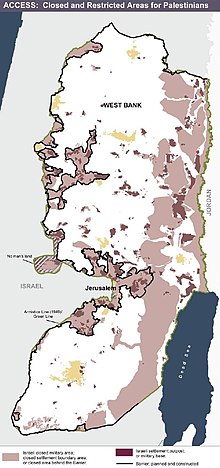
Back الاحتلال الإسرائيلي للضفة الغربية Arabic Ισραηλινή κατοχή της Δυτικής Όχθης Greek Ocupación de Cisjordania por Israel Spanish اشغال کرانه باختری توسط اسرائیل Persian השלטון הישראלי ביהודה ושומרון HE Pendudukan Tepi Barat oleh Israel ID イスラエルによるヨルダン川西岸地区の占領 Japanese 이스라엘의 서안 지구 점령 Korean Pendudukan Israel di Tebing Barat Malay مغربی کنارے اُتے اسرائیلی قبضہ PNB

The West Bank, including East Jerusalem, has been under military occupation by Israel since 7 June 1967, when Israeli forces captured the territory, then ruled by Jordan, during the Six-Day War.[a] The status of the West Bank as a militarily occupied territory has been affirmed by the International Court of Justice and, with the exception of East Jerusalem, by the Israeli Supreme Court.[1] The West Bank, excepting East Jerusalem, is administered by the Israeli Civil Administration, a branch of the Israeli Ministry of Defense.[2][3][b] Considered to be a classic example of an "intractable conflict",[6][c] Israel's occupation is now the longest in modern history.[7][d][8][9] Though its occupation is illegal,[e] Israel has cited several reasons for retaining the West Bank within its ambit: historic rights stemming from the Balfour Declaration; security grounds, both internal and external; and the area's symbolic value for Jews.[10]
Israel has controversially, and in contravention of international law, established numerous Jewish settlements throughout the West Bank.[11] The United Nations Security Council has repeatedly affirmed that settlements in that territory are a "flagrant violation of international law", most recently in 2016 with United Nations Security Council Resolution 2334.[12] The International Court of Justice has also found that the establishment of Israeli settlements is illegal under international law.[13] The creation and ongoing expansion of the settlements have led to Israel's policies being criticized as an example of settler colonialism.[14][15][16][17][18][f]
Israel has been accused of major violations of international human rights law, including collective punishment, in its administration of the occupied Palestinian territories.[g] Israeli settlers and civilians living or traveling through the West Bank are subject to Israeli law, and are represented in the Knesset; in contrast, Palestinian civilians, mostly confined to scattered enclaves, are subject to martial law and are not permitted to vote in Israel's national elections.[h] This two-tiered system has caused Israel to be accused of committing apartheid, a charge that Israel rejects entirely.[24][i][25][26][27] Israel's vast military superiority, with a modern army and air force, compared to the Palestinian use of guerrilla tactics, has led to accusations of war crimes on both sides, with Israel being accused of disproportionality and the Palestinians accused of indiscriminate attacks.
The occupation also has numerous critics within Israel itself, with some Israeli conscripts refusing to serve due to their objections to the occupation.[28] The legal status of the occupation itself, and not just the actions taken as a part of it, have been increasingly scrutinized by the international community and by scholars in the field of international law, with most finding that regardless of whether the occupation had been legal when it began, it has become illegal over time.[29][page needed][30][page needed][j]
Cite error: There are <ref group=lower-alpha> tags or {{efn}} templates on this page, but the references will not show without a {{reflist|group=lower-alpha}} template or {{notelist}} template (see the help page).
- ^ Domb 2007, pp. 511–513.
- ^ Benvenisti 2012, pp. 208–209.
- ^ Kimmerling 2003, p. 78, n.17.
- ^ Quigley 2009, pp. 47–48.
- ^ Dinstein 2009, pp. 20–21.
- ^ Bar-Tal & Alon 2017, p. 317.
- ^ Roberts 1990, p. 44.
- ^ Karayanni 2014, p. xv.
- ^ Hajjar 2005, p. 2.
- ^ Rathbun 2014, p. 205.
- ^ Kumaraswamy 2015, p. 409.
- ^ UNSC 2016.
- ^ Beaumont 2024.
- ^ Reuveny 2008, pp. 325–374.
- ^ Shafir 1984, p. 803.
- ^ Lentin 2018, p. 55.
- ^ Handel 2014, p. 505.
- ^ Zureik 2015, p. 51.
- ^ Ghanim 2017, p. 158.
- ^ Chalom 2014, p. 55.
- ^ Sharkey 2003, p. 34.
- ^ Cohen 1984, p. 2.
- ^ Ghanim 2017, pp. 154–158.
- ^ Zureik 2015, pp. 77–78.
- ^ Adam & Moodley 2005, pp. 19ff, 59ff.
- ^ Chappell 2022.
- ^ Holmes 2021.
- ^ Kidron 2013, p. 18.
- ^ Erakat 2019.
- ^ Finkelstein 2018.